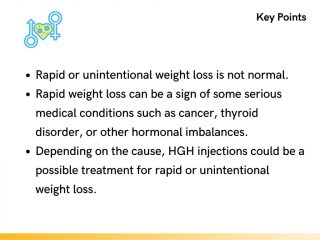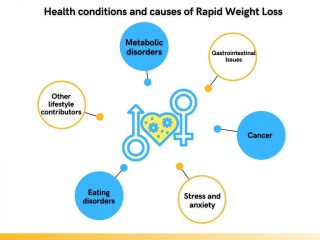Understanding Rapid Weight Loss – Is it Always a Bad Sign?

Losing weight rapidly or unintentionally could be a sign of any number of medical conditions or health issues. Rapid weight loss is not healthy or normal and should never be ignored. Conditions that could cause rapid weight loss include HIV-AIDS, gastrointestinal disorders such as irritable bowel syndrome, thyroid issues, and even some forms of cancer.
Depending on the cause of your rapid or unintentional weight loss, there are several methods that could be suggested to slow or reverse the process. Since rapid weight loss is also often accompanied by a loss of lean muscle tissue or “muscle wasting,” hormone therapies that are known to increase muscle mass, such as testosterone replacement or growth hormone injections, may be recommended.
Defining Rapid Weight Loss
Exactly what is considered rapid weight loss? Generally speaking, if you’ve lost a significant amount of weight, such as 5% of your total weight, within 6 to 12 months, it could be cause for concern – particularly if you are not dieting or otherwise trying to lose weight.
Regardless of the volume of weight you have lost or how fast, if rapid or unexplained weight loss is accompanied by other symptoms such as weakness, fatigue, loss of muscle, or gastrointestinal issues such as nausea, constipation, or vomiting, you should also seek medical advice.
Importance of Addressing Rapid Weight Loss
Rapid or unexplained weight loss can happen to anyone at any stage of life. However, statistically speaking, it occurs most often in people who are over the age of 65. It is critically important to address rapid weight loss because it could be a sign of several underlying medical conditions, some of which could be quite serious. These conditions may include cancer, hyperthyroidism, diabetes, gastrointestinal disorders, or infectious diseases. Addressing rapid weight loss in a timely manner allows for the early detection and treatment of these potentially serious or even fatal conditions.
Underlying Health Conditions and Other Causes of Rapid Weight Loss
There are several conditions, from metabolic disorders to gastrointestinal issues to hormone imbalances, such as growth hormone deficiency and low testosterone, that could cause rapid or unexplained weight loss. In addition, the causes of rapid weight loss are not only physical. Emotional issues such as stress, anxiety, and eating disorders can also contribute to rapid or unexplained weight loss. And, like any issue concerning weight and metabolism, diet, exercise, and other lifestyle issues can also play a role in rapid or unexplained weight loss.
Metabolic Disorders

Certain metabolic disorders, such as type 1 diabetes, could explain rapid weight loss. Patients with diabetes do not make enough insulin to use glucose for energy. When it is starved for energy by not being able to metabolize glucose, your body instead turns to burning fat and muscle, which can cause rapid weight loss. Rapid or unexplained weight loss is a symptom of type 1 diabetes.
Another condition related to metabolism, which can cause rapid weight loss, is congestive heart failure (CHF). CHF is a condition where your heart fails to put out enough blood volume. When your digestive system isn’t getting enough blood, it fails to digest food properly, leading to nausea, vomiting, and feeling full or bloated even when you are not eating enough, all of which can lead to weight loss.
Gastrointestinal Issues
A quite common cause of rapid weight loss is gastrointestinal disorders such as Chron’s Disease, Inflammatory Bowel Disease (IBD), or Irritable Bowel Syndrome (IBS). These types of conditions put your body in a catabolic state, which means it constantly uses energy. These conditions can also interfere with your hunger hormones ghrelin and leptin, effective appetite.
Cancer
One of the most common causes of very rapid or otherwise unexplained weight loss is cancer. Cancers that have been linked to rapid weight loss include pancreatic cancer, lymphoma, kidney, bladder, and colon cancers.
Psychological Influences That Can Cause Rapid Weight Loss
There are several psychological influences, such as depression, anxiety, and undiagnosed eating disorders, that could also be the cause of rapid or unexplained weight loss.
Stress and Anxiety
Stress, anxiety, and depression can cause loss of appetite. This is not only because when you are depressed, you may not “feel like eating,” but clinical depression actually causes changes in brain chemicals related to appetite.
Eating Disorders
Eating disorders are a major contributor to rapid weight loss. This is particularly true in teens and young women who tend to hide eating disorders. Rapid weight loss in teens is a sign of an eating disorder and could be a reason for you to be concerned about your teen.
Lifestyle Contributors
Other lifestyle habits can contribute to rapid weight loss. You simply may not be eating enough or exercising too much. Smoking can cause unwanted weight loss, as can excessive alcohol consumption.
Socioeconomic status plays a role; unfortunately for children and adolescents living in the US, living in substandard conditions or in poverty is the biggest risk factor for “failure to thrive,” which is a medical term used to describe children who are below the standard height and weight values for their age.
Weight loss, particularly in seniors, can be related to dental problems or poor oral health. People with missing teeth, loose teeth, or ill-fitting dentures often fail to eat properly and, therefore, can experience rapid or unwanted weight loss.
Recognizing Red Flags and When to See a Doctor
Because rapid weight loss could be a sign of some very serious underlying conditions such as cancer or AIDS, it is important to recognize the “red flags” or the symptoms of greatest concern.
While it is normal for our weight to vary from time to time, however losing more than 10 pounds or 5% of your total weight in less than a few months without trying to lose weight purposely is a cause for concern. This is especially important if you have other symptoms, too or are over 65.
Seeking Professional Guidance
Since there could be any number of causes of rapid or unexplained weight loss, finding the exact cause could be a bit challenging. Seeking professional help for rapid weight loss will most likely start with a thorough evaluation and history of your symptoms. Your doctor will ask about your symptoms when they started and about any known medical conditions you may have. Your healthcare provider will likely also ask you about medications you may be taking, as some medications can cause a lack of appetite and weight loss. You will probably also be asked about your eating habits, alcohol use, and mood states.
Since rapid or unexplained weight loss is more common in patients over the age of 65, your doctor could have good reason to suspect that age-related hormone loss could be the culprit or contributing to your rapid weight loss. Two critical hormones related to your body’s ability to build muscle and maintain a healthy weight, testosterone and HGH, both decline as you age. Prescription HGH therapy has been shown to provide positive results in patients who have been losing weight due to HIV-AIDS or other muscle-wasting disorders.
Diagnosing Rapid Weight Loss
Depending on the results of your initial evaluation, an exact diagnosis of what could be causing rapid weight loss could entail a number of diagnostic tests, including blood work and medical imaging. Specific tests for gastrointestinal disorders may be recommended, or cancer testing could be suggested if your symptoms warrant it.
Sometimes, despite all the examining, testing, and screening, the exact cause of rapid weight loss cannot be determined. In that case, your doctor may continue to follow and monitor you to see if the situation changes or if something comes up that can make a diagnosis more definitive. If no underlying condition can be determined, in addition to taking this “wait-and-see” monitoring approach, your doctor may recommend a special diet. For example, he may recommend that you add daily protein shakes to your meals to see that you get more calories or suggest that you add flavor enhancers to your food to make it more appetizing so that you eat more.
Treatments for Rapid Weight Loss
As you might imagine, treatments for rapid weight loss can be as varied as the causes. If stress, anxiety, or an emotional eating disorder is found to be the root cause, you may be referred to a counselor or mental health professional who specializes in such causes.
If a specific disease state or medical condition, such as cancer, diabetes, AIDS, CHF, IBD, or IBS, is determined to be behind your rapid or unexplained weight loss, referral to an apropos specialist or necessary medications or other treatments will be prescribed by your healthcare provider as needed.
If a hormonal imbalance is responsible, hormone therapy such as growth hormone injections may be recommended. Interestingly enough, while testosterone therapy and growth hormone therapy are often used to aid in weight loss, they both can also help people build back up who have lost too much weight too rapidly.
Emphasizing Health and Wellness
While many people strive to lose weight, rapid or unexplained weight loss is rarely healthy or a good thing. It is normal to want to maintain a healthy weight or to lose weight to promote overall health and wellness. But, rapid, unexplained, or chronic weight loss is almost always a bad sign and should not be ignored. Losing too much weight in a short period of time can be just as unhealthy and, in some cases, even more unhealthy for you as being overweight.
Rapid or unexplained weight loss is a warning sign that should not be ignored. It can indicate an underlying health problem that needs attention. Timely evaluation by a healthcare professional is crucial to identify and address the root cause and ensure the best possible outcomes for overall health and well-being.

